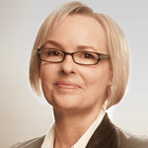Specialty
Geraldine Dawson
Autism Research
Self Exam
- Occupation: I am the Chief Science Officer for Autism Speaks, the nation's largest autism science and advocacy organization. I am also Research Professor of Psychiatry at the University of North Carolina at Chapel Hill, Adjunct Professor of Psychiatry at Columbia University and Professor Emeritus of Psychology at University of Washington.
- Alternative career choice: When I was in high school, I fantasized about being a back-up singer for Diana Ross.
- What do rock stars and scienctists have in common: Both professions require creativity, exploration, tenacity, resilience, and hard work.
- Musical Instrument I Play: None
- I tend to approach life: I am an optimist at my core. I believe in the ability for people to change the world for good. In my own career, I believe that science offers hope. As Christopher Reeves once said, "Once you choose hope, anything is possible."
- Biggest misconceptions about me or my work: Many people don't realize that science is an exciting profession. In the field of medical science, it is tremendously satisfying to be able to discover things that may help people live better lives.
- Worst part-time job ever: In high school, I worked in a lot of restaurants. I didn't enjoy scrubbing the grill at 2 AM after we closed every night.
- Longest med school study session: I pulled a lot of all-nighters trying to complete my doctoral dissertation on time.
- Best moment in medicine/research: Recently, my colleagues and I published the first randomized clinical trial showing very positive benefits of early intervention for toddlers with autism. The moment I saw the results of that study was one of the best moments of my research career.
About My Research
Disease Area: I have devoted my career to understanding and treating autism, a neurodevelopmental condition resulting in difficulties in social interaction and communication, and repetitive behaviors.
Research Area: My research has focused on the early detection and intervention in autism. I have also conducted studies of brain development and genetic risk factors.
Science Impact/Accomplishments or Goal: My lab was one of the first to demonstrate that autism can be detected in infants. We also conducted the first study to validate the phenomenon of autistic regression. We pioneered the use of home videotapes to study early autism symptoms and electrophysiological techniques to study brain function in young children with autism. In collaboration with Dr. Sally Rogers, I developed and empirically-validated the Early Start Denver Model, the first comprehensive early intervention program for toddlers with autism. I have collaborated on several studies that identified novel autism risk genes. These genetic discoveries are now being used for autism diagnosis and provided insights into the underlying biology of autism.
Research Description: "My laboratory focused on developing methods to study autism early in life. We discovered that by observing home videotapes of children later diagnosed with autism, we could detect symptoms before the full syndrome was present. We developed methods for measuring brain activity in infants that can be used for detecting autism. We now can diagnosis autism much earlier in life. We also developed behavioral interventions for young children at risk for autism. Our goal is to detect autism early enough that these interventions could reduce symptoms or even prevent the onset of autism. Our work on autism risk genes has fueled research on drug discovery. I hope eventually we will be able to reduce the burden of autism with effective biomedical treatments throughout the lifespan."
Biography
Dr. Dawson is the chief science officer for Autism Speaks, where she works with the scientific community and other stakeholders to shape and expand the organization’s scientific vision. Dr. Dawson holds the positions of Research Professor of Psychiatry at the University of North Carolina at Chapel Hill, Adjunct Professor of Psychiatry at Columbia University, and Professor Emeritus of Psychology at University of Washington. Dawson is a licensed clinical psychologist who has published extensively on autism spectrum disorders, focusing on early detection and intervention and early patterns of brain dysfunction. In collaboration with Dr. Sally Rogers, Dawson helped to develop and empirically-validated the Early Start Denver Model, the first comprehensive early intervention program for toddlers with autism. She has collaborated on numerous studies of brain development and function and genetic risk factors in autism. From 1996-2008, Dawson was Founding Director of the University of Washington Autism Center where she directed three NIH Autism Center of Excellence Award programs of research focusing on genetics, neuroimaging, early diagnosis, and clinical trials. At the Center, she also oversaw multi-disciplinary diagnostic and treatment services for children with autism from infancy through late adolescence. Dawson has been a consultant to the National Institutes of Health since 1989, including participating on the NIH Interagency Autism Coordinating Committee, NIH Committee on Practice Parameters for Screening and Diagnosis of Autism, NIH Scientific Advisory Panel to establish a 10 year road map for autism research, the NIH Consensus Panel on Phenylketonuria, and three NIH Grant Review Committees. Dawson is a Fellow of the American Psychological Society, American Psychological Association, and the Society of Clinical Child and Adolescent Psychology. Dawson’s honors include the Autism Society of America Award for Valuable Service, Washington Autism Society Achievement Award for Outstanding Service, Autism Society of Washington Medical Professional of the Year, Autism Society of America Award for Research Contributions, and the Autism Hero Award from Cure Autism Now. Dr. Dawson received her Ph.D. in Developmental and Child Clinical Psychology from the University of Washington.



